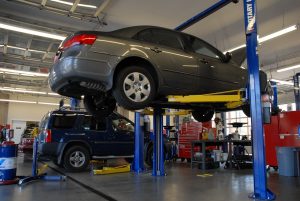When was the last time you took your car for a MOT test? In most of the UK, all vehicles on the road go through an annual test to assess their safety. Owners have a high degree of flexibility over where they have their test done. There is a huge network of garages across the UK offering MOT tests. A recent announcement from the Driver and Vehicles Standards Agency (DVSA) extends the need for basic police record checks to key personnel working within garages. So what’s going on?
Garages and MOT Checks Currently
 There are hundreds of MOT test stations in the UK, from the north of Scotland to the south of Cornwall. Thousands of vehicles go through the MOT test every year, with around two thirds passing first time. Not every mechanic has the qualifications needed to do MOT tests. In order to become a tester, an experienced mechanic has to go through specific training and assessment. In a large garage, only a few of the mechanics might be MOT testers. The DVSA also puts lots of effort into ensuring the system is fair and works in the same way across the UK. They look at statistics regarding passes and fails across the UK, which helps them quickly pick up when a garage appears to be either too tough or too lenient.
There are hundreds of MOT test stations in the UK, from the north of Scotland to the south of Cornwall. Thousands of vehicles go through the MOT test every year, with around two thirds passing first time. Not every mechanic has the qualifications needed to do MOT tests. In order to become a tester, an experienced mechanic has to go through specific training and assessment. In a large garage, only a few of the mechanics might be MOT testers. The DVSA also puts lots of effort into ensuring the system is fair and works in the same way across the UK. They look at statistics regarding passes and fails across the UK, which helps them quickly pick up when a garage appears to be either too tough or too lenient.
There’s also a “mystery shopper” programme whereby undercover drivers take a car with known faults for a test. The DVSA is continually evolves how they operate, and the latest announcement about police record checks is all about ensuring the integrity of the testing system as well as making sure the right people are approved to run tests.
Police Record Checks for Everyone?
Not every garage employee is going to have to apply for a criminal records check. The DVSA only requires that the owner of the garage who oversees the MOT booking and is in charge of the testing staff and the testers themselves need a certificate. Furthermore, this requirement only applies to people applying for registration as a tester or manager on or after 1 November 2019. People who are currently running MOT tests won’t have to apply in retrospect. Going forward, it is likely that they will be asked to apply for a basic disclosure when they renew their registration.
There are three levels of detail in police checks, and mechanics only need the basic level. A basic police check looks at current, unspent convictions only. Unspent is a legal term which allows crimes to be forgotten after a set period of time. This period of time varies depending on the type of crime, and age of the offender. Some very serious crimes will never be “spent”. The DVSA will look at the information presented on a DBS certificate, and use it to assess the character of the applicant. It’s all about making the process more secure. Customers should be able to put more trust into their local garage.
Other Changes Regarding Police Record Checks
There are also some other changes rolled into this legislation. The DVSA has also put into place a new requirement about informing them about crimes. Again, this doesn’t apply to everyone working in the garage. Only managers, and the people performing the MOT tests are affected. The law states that testers and managers have to inform the DVSA if they are given a sentence of any of the following:
- Sentence of three months or more (including suspended sentences)
- A community service sentence of 60 hours or more
- A fine of £2,500 or more
If the crime happens overseas, the DVSA has to be told. Testers who have a fine, or a sentence to community service might not lose their right to test. The DVSA will look at the circumstances of each offence to make a decision.
How to Apply for a Records Check
There is lots of information on the DVSA website about getting a criminal records check. It does involve a bit of form-filling, but is not a complicated process. Applying for your passport, for example, is more complicated. The key things to remember are to fill in all the boxes, and give all previous addresses. The DBS has a helpline to answer all questions about DBS checks.